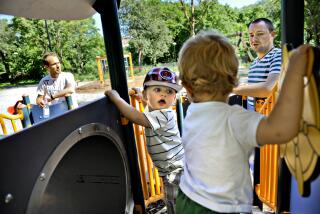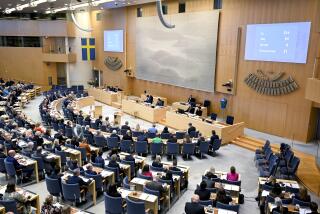Swedish Women Activists Oppose Entry Into EC, Fearing an Erosion of Freedom
- Share via
STOCKHOLM — Swedish women are up in arms over their government’s plans to join the European Community, contending that it threatens their freedom and equality.
While Prime Minister Ingvar Carlsson was delivering Sweden’s membership application July 1, women’s groups were making unflattering comparisons between sexual equality in Sweden and the EC.
“Women in EC countries are housewives far more than in Sweden,” a group called Nordic Women Against the EC said in an article in the Stockholm daily Aftonbladet.
Damerna, a leading women’s magazine, published a reader’s letter saying that in Europe men hold the family purse strings. “What about single mothers? Do we Swedish women have to step backward to join the EC? Belong to men again? No way!”
Swedish women combine one of the advanced world’s highest birth rates with full employment, thanks to public care of children, the sick and elderly.
Benefits such as 15 months paid maternity leave, shared between a child’s parents whether married or not, encouraged 124,000 births in a population of 8.5 million last year--an absolute increase in the population for the seventh year running.
Women make up two-thirds of the 1.6 million people employed in the public sector, they have 38% of the 349 seats in Parliament, and more than 80% of women of working age actually have jobs.
Gunilla Winberg, organizer of a Swedish “No to the EC” campaign, said the EC “is mostly concerned with making Europeans richer.”
“I believe women in general have a greater sense of solidarity with the rest of the world than the EC itself has,” said Winberg, a former development worker in Africa. “I know that many women share this opinion.”
Energy Minister Birgitta Dahl said in an interview: “I was also once an opponent of EC entry. But the situation has changed. The Cold War is over. We are on our way to a more democratic, humanistic and peaceful Europe.”
Sweden could play a role as bridge-builder and mediator in the new Europe and promote its central values--the right to work, equality of women, environment and welfare, Dahl said.
“There are right-wing pressures, both here and in the rest of Europe, which threaten those values.
“We need ideas in society as to how we can set longer-term goals against egoism, short-term profitability and ruthless capitalism.”
Many women fear that whoever wins Sweden’s general election due Sept. 15 will cut taxes and the public payroll, the two foundations of Swedes’ cherished free lifestyle.
“Women do not want to be sent back to their kitchens,” said trade unionist Kristina Persson.
Even the ruling Social Democrats, who in past recessions have mopped up unemployment by creating more public jobs, say that this time the state administration must shrink.
“All the parties are competing to cut taxes, even the Social Democrats. This will hit women directly, because they are so dependent on the smooth functioning of the social welfare system,” Persson said.
A diplomat from one EC country agreed: “Women would be the first to suffer from any reduction in public spending.”
Persson said: “Equality of the sexes is threatened as never before. More and more voices are raised in favor of sending women back to unpaid care of children, the aged and sick.”
But she added she does not regard the EC as “a trap for women. . . . It is up to Sweden to bring out the social dimension in the community.”
The National Council for International Health, a U.S. pressure group, gave its annual prize to Sweden this year for contributing to women’s health. The council cited Sweden’s low rate of perinatal mortality and high maternity standards.
Social Affairs Minister Ingela Thalen told reporters at the prize-giving ceremony in Washington: “Swedish women feel on top of the world. But that standard cannot be kept up if you also try to save billions of kronor in the public sector.”
More to Read
Sign up for Essential California
The most important California stories and recommendations in your inbox every morning.
You may occasionally receive promotional content from the Los Angeles Times.










